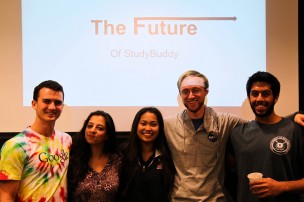The WesHack-born app Study Buddy helps students make the most of their study sessions.
Small classes are generally considered a positive attribute of Wesleyan, but sometimes they make it difficult to find friends with whom to work and study. At the suggestion of Katya Sapozhnina ’16, director of the Wesleyan Entrepreneurship Society, a team of seniors seized the opportunity provided by the third annual WesHack competition to search for a solution. WesHack 2014 took place on the weekend of Sept. 5 through 7. At the event, teams of students had to create functioning apps entirely from scratch. Participants were allowed to enter the competition with ideas of what they might create, but the entire app had to be built during the intensive two-day period.
“It turns into a mess at the end, but it’s pretty cool how you get to make a whole application in one weekend,” said Aaron Plave ’15.
Plave, along with Aaron Rosen ’15, Darshdeep Hora ’15, Denise Francisco ’16 and Lili Borland ’15, worked tirelessly for 48 hours to come up with a functional app that they hope will make a difference in the lives of college students across the country.
Study Buddy, currently online and fully functional, was created as an alternative to the current room-booking system on campus, which many find fault with. In addition to finding available rooms for studying, the users of the app will also allow its users to find where others in their classes are already working.
“If you don’t know a lot of people in your class, and you have a test coming up or a homework assignment due the next day, then you can post on this app that you’re going to be working on this assignment,” Rosen said. “It [also] gives you a list of study sessions going on around campus and where to find them.”
Plave agreed with his teammate.
“This is kind of a way to break the ice a bit and jump in in a semi-formal way to study with people,” he said.
The team stressed that while this app is meant to put students in contact with one another, it was not designed as a social network. Students are not meant to maintain relationships through the app, but rather use it as an initial meeting point for future, real-world interactions.
“I think it will bring people together,” Plave said. “I’ve been in classes sometimes, and I don’t know anybody in the class, and I’m always like, ‘Well, I wish I could study with some of these people.’”
While Study Buddy was designed for academic purposes, it could very well have added benefits, according to one of its creators.
“They told us in Intro to Psych that most of the friends you make are also buddies that you study with,” Hora said. “Hence, Study Buddy.”
Currently, anyone can access the app through its website, studybuddy.weshack.com. Logging in is simple: students can use their ePortfolio usernames and passwords. By either entering a department or course number, students can search for available spaces and existing study groups. The app also provides a place for students to create groups that their classmates can then look up and join. If one is looking for a comical diversion, the “I’m feeling lucky” button will offer an amusing surprise by introducing students to individuals at random.
Future plans for the app are not limited to the University.
“Ultimately, we want to start selling it to schools so that they can put it in their version of the ePortfolio, so they can make it more accessible to students,” Rosen said.
All five members of the team are Computer Science majors, and though this is the field in which they spend most of their time, they are grateful for the opportunities that the WesHack competition has afforded.
“[Computer Science] majors at Wesleyan, we don’t really get much of a chance to do this software stuff,” Hora said. “Like, you do a lot of theory and learning algorithms, so that’s why I think the Hackathon was popular, because everyone got to really make something. For me, an interesting part is to make something and see it work. If it works, that’s really cool.”
